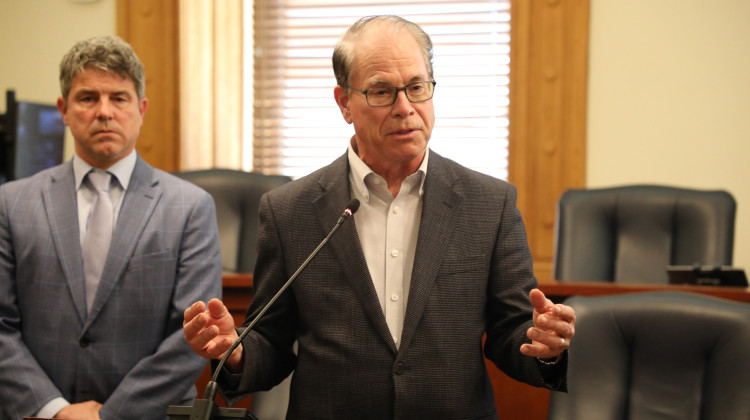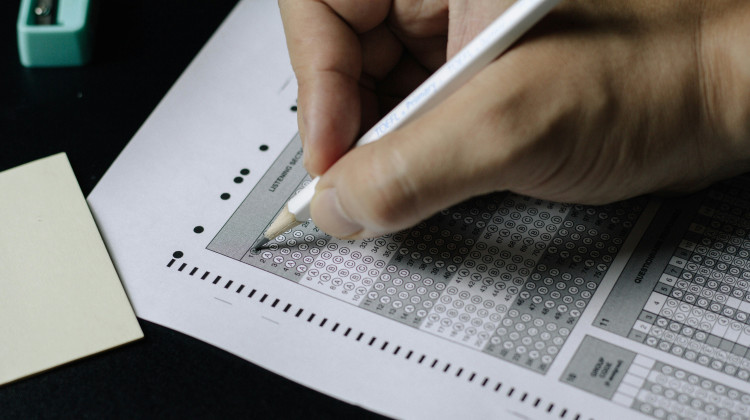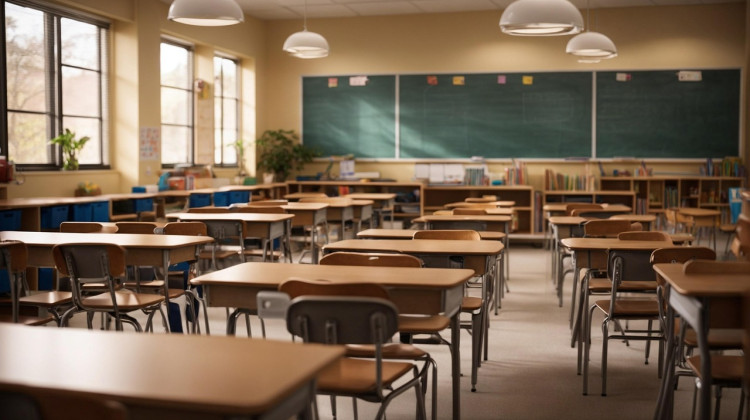
Indiana Gov. Mike Braun speaks to the media on Wednesday, April 23, 2025 in the Statehouse as Senate President Pro Tem Rodric Bray listens.
Ben Thorp / WFYINew laws are coming to Indiana schools after the Indiana General Assembly concluded the 2025 legislative session last month.
Gov. Mike Braun signed dozens of education-related bills since last month, including his priority property tax reform package, which is expected to cost schools $744.4 million in property tax revenue.
The law also requires school districts to share local property tax revenue with eligible charter schools beginning in 2028.
State lawmakers passed a two-year budget. Indiana’s support for K-12 makes up 46% of the budget. Schools will receive a 2% increase each year of the budget.
That also includes the expansion of vouchers to private schools starting in mid-2026 and money for textbooks so parents don’t have to pay for them.
Here’s how some education legislation could impact schools as soon as next academic year.
HB 1002: Deregulation of education laws
This sweeping bill aims to remove what GOP lawmakers described as outdated and duplicative regulations from state education laws – known as Title 20.
The goal of stripping it back, legislation author Rep. Bob Behning (R-Indianapolis) said, is to take some of the directives off schools and districts. This process is just beginning, Behning said changes will take at least three years.
It grants the governor more authority to appoint a Secretary of Education without the previous requirement of advanced degrees or education experience, like being employed as a principal or superintendent at the time of appointment.
Behning said “maximum flexibility” should be available to whoever is governor.
There were a number of unexpected additions to the legislation toward the end of session, including removing a requirement for high schools to offer an ethics course.
Since 2018, every high school was mandated to offer a semester-long ethnic studies elective course annually.
Sen. Jeff Raatz (R-Richmond) said the course was removed as a state requirement to comply with federal guidance to remove diversity, equity and inclusion from public education.
The course requirement coincided with academic standards that laid out course options on the subject, like topics such as cultural self-awareness, and cultural histories and practices.
HB 1348: Diplomas for nonaccredited private schools and homeschools
This law recognizes diplomas from homeschooling and other nonaccredited private schools as valid for meeting state requirements for completing high school.
This legislation also bars state institutions from rejecting or treating “a person differently based solely on a diploma or credential that is issued by a school.”
The bill’s author Rep. Tim Wesco (R-Osceola) said this legislation ensures that homeschool students are treated the same as students who attend public schools.
During the legislative session, Democrats were concerned that this legislation legitimizes mostly unregulated homeschools and nonaccredited public schools.
HB 1498: A-to-F grades for schools
Indiana schools will once again be assigned A-to-F letter grades.
The legislation would remove some of the older accountability framework so that a new A-F model can be written by the State Board of Education by the end of 2025.
The bill outlines specific guidelines for measuring school performance. The new system would prioritize students earning diploma seals, among other requirements.
HB 1498 also calls for schools to continue receiving null letter grades through this school year.
The A-F accountability system made a slow comeback. A 2023 law tasked the state education board with updating the way it evaluates public and state-accredited nonpublic schools.
HB 1499: New literacy rules
Students who do not pass the state literacy test, IREAD-3, will be required to repeat third grade, unless they qualify for specific exemptions.
Under House Bill 1499, students would get two more chances to pass the test during the summer before they are held back in the fall.
This legislation also extends exemptions for English language students through 2026-2027.
Students who fail the reading test and attend a school where the majority of students are English language learners will be exempt and go through a registration process with the education department.
HB 1515: Indianapolis Local Education Alliance, other education matters
The legislation prohibits counties, cities and towns from regulating how a school district, charter school or nonpublic school uses its property. The bill specifies that a charter school is allowed as a permitted use in all zoning districts.
The legislation halts municipalities from utilizing zoning rules to keep charter schools out of their communities.
In Washington Township, a zoning fight emerged over an all-girls charter school.
The legislation also creates a mastery-based education pilot program that seeks to ensure K-12 students understand what they are learning rather than moving on without mastering a topic or subject.
A focus of the bill creates an alliance between Indianapolis Public Schools and Mayor Joe Hogsett to plan for the future of the district.
Indianapolis Local Education Alliance will write a non-binding plan for how to share school buildings and school buses between district and public charter schools.
In addition to the alliance, the legislation establishes an optional, three-year statewide pilot program for facilities and transportation consolidation between districts. The pilot programs would create local boards to oversee changes.
HB 1634: Math education
This law requires schools to provide early intervention for K-8 students struggling with foundational math skills.
The bill’s author Rep. Jake Teshka (R-North Liberty) said he hopes to boost math scores with similar focused attention that led to improvements in reading.
Although the legislation had strong bipartisan support, some Republicans – like Sen. Aaron Freeman (R-Indianapolis) – pushed back on more regulations for schools.
SB 1: Property tax plan
Senate Bill 1, ushered through the Statehouse by Sen. Travis Holdman (R-Markle), provides homeowners a tax credit on their homestead property tax bills beginning in 2026.
Property tax reform is expected to affect local government and schools. School corporations could lose millions over the next three fiscal years, according to a state estimate.
House Republicans added language requiring local property tax revenue to be shared between traditional public school districts and charter schools starting in 2028.
The sharing of operations fund revenue, which covers transportation, utilities and capital projects, would be phased in over four years. The measure impacts about 30 school districts.
Charter schools are expected to receive about $4.7 million in the first year. Democratic lawmakers called out the lack of fiscal projections beyond that.
SB 143: Parental rights
The controversial bill restricts government entities like the Indiana Department of Child Services and school districts from infringing on parental rights or withholding information from parents.
It also allows parents to bring action against government agencies found to violate this rule.
SB 146: Teacher pay
This bill increases the state’s minimum teacher salary from $40,000 to $45,000 starting in July 2025. It also bumps up how much state tuition support must go to teacher compensation from 62% to 65%.
Only 44 school districts had a minimum salary above $45,000 in 2024, according to the state Legislative Services Agency.
The final proposal also sets up a means for the education department to address school districts that fail to comply with this rule, including a written notice about not meeting the minimum and a requirement to share that publicly.
SB 287: Partisan school board races
Beginning in 2025, school board candidates may declare a party affiliation, remain independent or choose to run as nonpartisan. State law currently requires school boards to be nonpartisan – so candidates don’t run with a party affiliation. Board members set policies and strategic goals, hire the district’s superintendent and oversee the budget.
The federal Hatch Act limits political activities for federal employees. It was brought up by many opposed to this legislation. That means it could prevent any federal employees from running for a school board that introduces political parties, even if they choose to declare nonpartisan or independent.
SB 442: Sex education
Sex education courses will be required to show at least a three-minute ultrasound video on fetal development in the uterus plus a computer-generated process of fertilization and development.
The new rule adds that instruction should be “age appropriate” and include a discussion about the importance of consent to sexual activity between two individuals, which was removed at one point but put back in by the bill’s author.
Consent forms for sex education must now state whether the class will be taught to each sex individually or in a unified setting and what the instructor’s sex is, among other measures.
Rachel Fradette is the WFYI Statehouse education reporter. Contact Rachel at rfradette@wfyi.org.
 DONATE
DONATE






 Support WFYI. We can't do it without you.
Support WFYI. We can't do it without you.